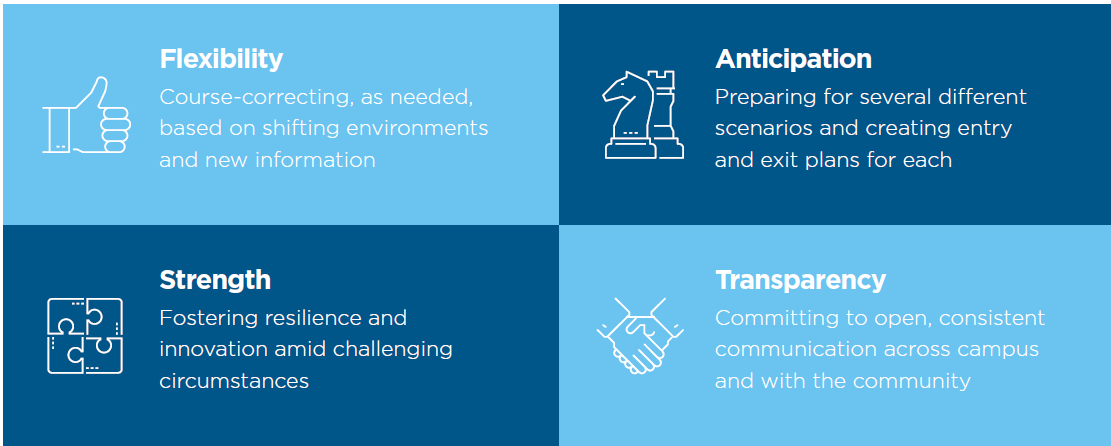In Brief
Recovery from crisis is nothing new in higher education, but rarely has this meant risking the health and safety of students, faculty, staff and community members. And while higher education has shown a willingness to persevere throughout the COVID-19 pandemic, the industry has often struggled to embrace rapid responses and true transformation. Colleges and universities will need to do things differently to not only endure the current crisis but also emerge stronger and better prepared to navigate an evolving funding landscape and competitive environment.
Higher education leaders are commonly called to make difficult decisions, yet the difference today is the exceedingly unstable environment in which they are operating and the unprecedented speed and agility with which decisions must be made. By incorporating principles of agile decision making, leaders can help prepare their teams to adapt to rapid change throughout what is sure to be a period of significant flux over the coming months and years.
“FAST” Decision Making Sets Leaders Up for Agility
There are four primary dimensions of effective agile, or “FAST,” decision making — flexibility, anticipation, strength and transparency. The FAST framework provides leaders with a tool to balance speed and structure, understanding that the consequences of their decisions are amplified in times of crisis.
- Flexibility: By building leaders’ agility and adaptability, the institution will be able to pivot more quickly, as needed, based on new information. To build this capacity, leaders should:
- Clarify roles for effective and quicker decision making.
- Invest in descriptive data analytics to inform decisions.
- Delegate less-critical decisions to maintain leadership focus.
- Anticipation: While all the necessary information may not be available, leaders can empower quick action by preparing for a wide range of possible scenarios. To build this capacity, leaders should:
- Undertake detailed scenario planning.
- Invest in predictive data analytics to inform planning.
- Frequently solicit input from all stakeholders (students, staff, faculty, community, etc.).
- Strength: Strong leaders are leaning in to empower resilience and innovation across their teams, even in the face of challenging circumstances. To build this capacity, leaders should:
- Apply lessons learned to continuously improve decisions and strategies.
- Sustain energy under pressure to cope with disruptive changes.
- Stand up cross-functional response teams of top performers to navigate change.
- Transparency: Although information is flowing rapidly and change seems nearly constant, the most effective leaders are keeping their teams (and their communities) in the loop. To build this capacity, leaders should:
- Ensure senior leadership is visible and accessible.
- Leverage multivariate channels of communication to make sure messages are heard.
- Utilize forums for two-way communication to receive ongoing feedback.

“FAST” Decisions in Action: Fall 2020
The industry’s flow of information, analysis of data and decision making moved quickly in March when it became apparent the pandemic would shut campuses down. Institutions reacted rapidly to evaluate new variables and identify the best course of action for their unique situations. As day-to-day operations revert to a more normal pace, leaders are turning their focus to the fall. Several universities have already declared their intentions to maintain remote operations, reopen their campuses entirely or pilot a hybrid model for the fall. Many more, however, have not yet made a call. Another survey of higher education leaders conducted by the American Council on Education found that between April and May of this year, the topic of “deciding on fall term plans” emerged as a top concern for university executives. As of late May 2020, only 18% said their institutions had already decided and announced their fall plans.
The Chronicle of Higher Education maintains an updated list of announced plans for fall 2020. At the end of May 2020, about 66% of respondents said they were planning to reopen their campuses for in-person classes and services, 7% were planning to be exclusively online, 8% were proposing a hybrid model, and the rest were either “waiting to decide” or “considering a range of scenarios.”
As fall approaches, the speed of information will increase as municipalities reopen, infection rates fluctuate and universities make decisions related to the state of residential education in the fall. Information will be imperfect, and public perspectives regarding the interpretation of information will quickly evolve. As a result, speed and agility must be valued over getting to “the perfect solution,” which in these circumstances will not exist. Putting these FAST principles in place now will enable institutions to anticipate contingencies, swiftly operationalize plans and successfully manage through this period of uncertainty.
